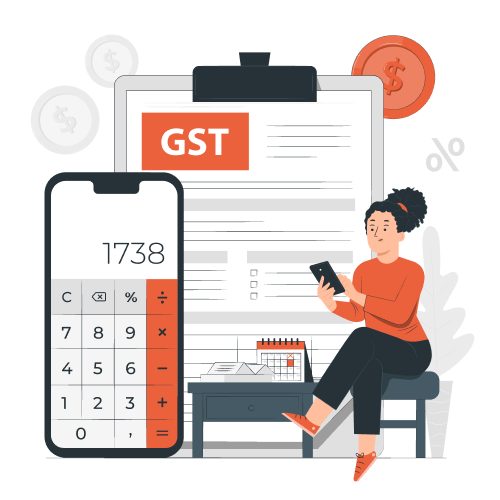Online GST Registration Services in India - Your Trusted Partner for GST Registration
Welcome to the easiest, fastest, and most reliable platform for GST Registration Online. Our expert team ensures quality legal guidance and competitive pricing, providing a hassle-free process. Choose us to register for GST online and enjoy a stress-free experience!
 Swift Swift |
 Professional Professional |
 Precise Precise |
 One Stop One Stop |
Brief About GST Registration Services
As per the GST rules, every business/entity involved in buying and selling goods/services must apply for a GST number. It is mandatory to complete the goods and services tax registration if the turnover exceeds the threshold limit of Rs 40 lakhs for trading and manufacturing or 20 lakhs for service industry (Rs 10 lakhs for special category states - Arunachal Pradesh, Assam, Jammu & Kashmir, Manipur, Meghalaya, Mizoram, Nagaland, Sikkim, Tripura, Himachal Pradesh, and Uttarakhand). Further, if anyone wants to get registered voluntarily even if the turnover is less than the threshold, they can always choose to do so.
Understanding GST Registration
GST registration is more than a compliance requirement; it's a step towards streamlined business operations. Whether you're mandated to register due to your turnover or seeking voluntary registration for the benefits it offers, SuperCA's expert team ensures your registration is handled professionally. Learn more about how GST can benefit your business and how SuperCA can facilitate your journey.

Personalized Attention with Tailored assistance throughout filing process.

Value for Money with maximized refunds and no hidden charges.

Client Confidentiality with Data privacy and adherence to legal guidelines.

Excellent Customer Support with 24x7 support and expert guidance.




ADVANTAGES OF GST REGISTRATION

LEGAL RECOGNITION
By registering to GST, you will be legally recognized as a supplier of goods/services & would get authorization to collect tax from customers and pass on the credit of the taxes paid on the goods/services that is provided to the recipients.
ELIMINATES CASCADING EFFECT
GST has eliminated the cascading effect of tax that was earlier noticeable and put an end to the tax-on-tax impact on goods and services.
TRANSFER OF INPUT TAX CREDIT
Registered person can pass on the credit of the taxes paid on the supply of the goods & services to the purchaser.
LESS COMPLIANCE
Pre-GST tax regime was a time where we saw a tiresome burden of compliances on businesses as they had to file various returns accorded with taxes like VAT, Excise, and Service Taxes. GST being a unified & singular tax regime has lowered the number of filings thus providing much needed relief to business. By merging all the indirect taxes under its ambit, GST has managed to bring down the cost of goods and services.
EASE IN GETTING BANK LOANS
GST registration and filing acts as proof of business activity and creates a track record for a business. Banks and NBFCs lend to businesses based on this data. Hence, GST registration can help you in formalizing your business and get credit.
BENEFIT OF COMPOSITION SCHEME
The GST Composition Scheme has been introduced to provide relief to the small businessmen (having turnover of less than 1 Cr) in the tax system and to ease their difficulties. By opting for the composition scheme, the businesses will be taxed at a fixed rate, also having the advantage of lump sum tax payment and only one return in 3 months.Choose Your Plan
₹1500+GST
GST REGISTRATION CERTIFICATE
E-WAY BILL PORTAL REGISTRATION
GST INVOICING FORMATS
3 MONTHS RETURN FILING
CURRENT ACCOUNT OPENING SUPPORT
SUPPORT REGARDING GST RATES/HSN
DEDICATED GST & E-WAY BILL EXPERT FOR FIRST 3 MONTHS
AFFORDABLE GST REGISTRATION CHARGES AT ₹ 1500/- PLUS GST
Transparent Pricing, No Surprises: Embark on your GST registration journey with SuperCA, starting at just ₹1500+GST. Our packages offer comprehensive support beyond the basic application process, including E-WAY BILL and GST invoicing formats. While direct registration is available, choosing SuperCA means choosing peace of mind with no hidden charges.
What is GSTIN
GST Identification Number or GSTIN, also known as the GST registration number, is a 15 digit number which is assigned to every GST registered person. It has replaced the earlier Tax Identification number which was allocated to businesses by state tax authorities for registering under the VAT system. GSTIN is a State Specific code therefore you have to take separate state wise registration for business branches in different states.
The format of GSTIN is as follows:
- ➙ The first two digits represents the unique code of the specific state.
- ➙ Next ten digits (3-12th) is the PAN number of the taxpayer.
- ➙ The 13th digit will be assigned based on the number of registration within a state.
- ➙ The 14th digit will be “Z” by default
- ➙ The 15th digit may be an alphabet or a number which will be used as a check code.
Compulsory Registration
GST registration is mandatory for all individuals/entity given below -
- ➙ All Entities/Casual Taxable persons making Interstate Taxable supply and whose turnover exceeds Rs 40 lakhs (for trading and manufacturing) or 20 lakhs for service (Rs 10 lakhs for special category states)
- ➙ Input Service Distributor (ISD)
- ➙ Non-Resident Taxable persons making Taxable supply.
- ➙ E-commerce aggregators
- ➙ Supplier of OIDAR (Online Information and Database Access or Retrieval) services from outside India to a person in India, other than a registered taxable person.
- ➙ Agents of a supplier making supply on behalf of a taxable person.
- ➙ Persons required to pay tax under Reverse Charge scheme.
- ➙ TDS Deductor.
Exemptions under GST
The following people/entities are exempted from getting GST registration:
- ➙ Agriculturalists for the supply of crops produced from the cultivation of land.
- ➙ Activities that do not come under the supply of goods or services. (Examples - sale of a building or land, and services provided by an employee.)
- ➙ Businesses that make non-GST/ non-taxable supplies. (Examples - aviation turbine fuel, electricity, natural gas, high-speed diesel, and petrol.)
- ➙ Businesses that make exempt/ nil-rated supplies.
- ➙ Businesses that do not fall under the threshold exemption limit.
- ➙ Other Businesses that do not fall under the mandatory registration bucket.
Types of GST Registration
The GST Act prescribes various types of registration under its ambit. The main ones are discussed briefly below -
Normal Taxpayer: This category holds most of the businesses of India. There is no necessity of putting down any money as deposits for Normal Taxpayers. There is also no expiration date of registration under this category.
Casual Taxable Individual : Individuals who wish to set up an occasional/seasonal shop can opt for this category. For instance, say Mr X has a place of business in Delhi and supplies taxable consulting services in Patna where he has no place of business . He would be treated as a casual taxable person in Patna.
In this case, you have to deposit an advance sum of money that is expected to be equal to your GST liability during the operational time-period of the seasonal shop or business. The registration under this category is active for 3 months which can be renewed.
Composition Taxpayer: In the GST composition scheme, businesses/individuals have to deposit a fixed yearly payment irrespective of their actual earnings.Small taxpayers can get rid of tiesome formalities and pay GST at a fixed rate of turnover. Entities having a yearly turnover of up to Rs. 1 Cr are eligible to get registered as composition taxpayers. It is also imperative to note that they will not be able to claim Input Tax credit under this category.
Non-Resident Taxable Individual: People who reside outside India, but supply goods to individuals who stay in India, can opt for this type of GST Registration. As per the GST rules, when a non-resident occasionally supplies goods/services in a GST applied region and does not have a fixed place of business, he will be treated as a non-resident taxable person. It is similar to a casual taxable individual, just that in this case the non-resident has no place of business in India.
You have to deposit a sum equal to the expected GST liability during the operational time-period of registration. Usually, the normal tenure of registration is 3 months, but can be extended or renewed by the taxpayer.
Penalty for NOT Obtaining
GST Registration.
If an eligible individual/business carries on business without registering to GST and paying taxes, it will be considered an offense under GST and penalties will be applied. In case the reason is genuine or unintended, the individual/entity is liable to pay 10% of the total tax amount. But this is applicable only if the burden of total tax is Rs. 1 Lakh or more. In other cases where this seems intentional, the individual/entity is liable to pay the whole due amount as penalty.
There could be other bad consequences arising which include raising a question of your trustworthiness in front of authorities in future, attracting frequent checks, or any other unwanted issues. That’s why it is always advisable to adhere to the GST rules.
Components of GST
Under GST regime, there are 4 components namely :
- Integrated Goods and Services Tax (IGST)
- State Goods and Services Tax (SGST)
- Central Goods and Services Tax (CGST)
- Union Territory Goods and Services Tax (UTGST)
Under the GST law, the government will collect CGST, SGST or IGST depending upon whether the transaction is intrastate or interstate. These are briefly discussed below -
Central Goods and Services Tax (CGST)
CGST is charged on the intrastate supply of goods and services by the central government .
It is collected along with SGST at the same rate. Both the Central and State Government collect the taxes and combine their levies with an appropriation proportion between them. Further, the GST rules also says that the taxes which are imposed on the intra supplies of goods and services shall not be more than 14% each.
State Goods and Services Tax (SGST)
As we discussed above, SGST will be applicable at the same rate and along with CGST on every taxable intra-state supply, but CGST will be controlled by the Central Government. SGST on the other hand is collected by the State Government and is governed by the SGST Act. Any tax liability under SGST then can be set off in opposition to SGST or IGST ITC only.
Union Territory Goods and Services Tax (UTGST)
UTGST is very similar to SGST which is applicable on the supply of goods/services in the Union Territories like Andaman and Nicobar Islands, Chandigarh, Daman Diu, Dadra, and Nagar Haveli, and Lakshadweep.
The UTGST is governed by the UTGST Act and the revenue earned is collected by the Union Territory government. The UTGST is a replacement for the SGST in Union Territories, but the concept of CGST will be the same.
For Instance, a dealer in Jharkhand is selling goods or providing some service to the consumer in the same state worth Rs. 40,000. The GST rate, let's say is 12% consisting of 6% CGST and 6% SGST, in such cases the dealer collects Rs. 4800 from which Rs. 2,400 will go to the central government and Rs. 2,400 will go to the State government.
Integrated Goods and Services Tax (IGST)
IGST is applicable on all inter-state supplies of goods and services. It is also applicable on the imports and exports of goods and services, and on supplying activities related to Special Economic Zones. In the case of interstate tax collection, instead of separately charging taxes for the Center and the State, the Government collects a single IGST, which is divided later
For Instance, if the dealer in Jaipur sold goods to a dealer in Patna worth Rs. 1,00,000. GST rate, let’s say be 12%, then in such cases the dealer has to charge Rs. 12,000 as IGST.
What is GST Return
GST Return is a form that shall be filed by every registered taxable person. Furnishing GST Returns timely helps the GST authorities carry out taxpayer’s assessment. Also, business owners need to maintain records systematically to further simplify the GST return filing process.
A business or the taxpayer while online GST return filing requires details of the following for a specified period of time -
- The total sales
- The total purchases
- The output GST or the GST paid by the customers
It is crucial for every business, irrespective of the business structure, to adhere to the statutory compliance and complete all the necessary filings before the due dates..There are quite a few types of GST filing which have their specific forms and each form has a different purpose and due date.Taxpayers also need to ensure that they don’t need to file all forms but only those that are applicable to them.
| Return Form | Description | Frequency | Due Date |
|---|---|---|---|
| GSTR-1 | Statement of Outward Supplies made | Monthly Quarterly (If opted under the QRMP scheme) |
11th of the next month 13th of the month succeeding the quarter |
| GSTR-2 (suspended) | Statement of inward supplies made | Monthly | --- |
| GSTR-2A | Read only documents for the recipients, to verify the details uploaded by the seller in GSTR 1 | Monthly | 15th of the next month |
| GSTR 3 (suspended) | Auto populated document based on the details found in GSTR 1, GSTR 2 and tax liability of any preceeding period | --- | --- |
| GSTR-3B | Inward and Outward supply summary | Monthly Quarterly |
20th of the next month from the month of January 2021 onwards 22nd or 24th of the month next to the quarter |
| GSTR-4 | Quarterly return for composition traders. | Annually | 30th of the month succeeding a financial year. |
| GSTR-5 | Monthly return for Non-Resident taxable people. | Annually | 20th of the next month |
| GSTR-6 | Monthly return for Input Tax Distributor | Annually | 13th of the next month |
| GSTR-7 | Monthly Return for Tax Deductor. | Annually | 10th of next month |
| GSTR-8 | Monthly return for E-Commerce Operators. | Annually | 10th of next month |
| GSTR-9 | Annual GST Return | Annually | 31st December of next financial year. |
| GSTR-9A (suspended) | Annual Return for Composition Scheme taxpayer | Annually until FY 2017-18 and FY 2018-19 | --- |
| GSTR-9B | To be filed by E-Commerce operator | Annually | 31st December following the financial year end. |
| GSTR-9C | Reconciliation Statement | Annually | 31st December following the financial year end. |
| GSTR-10 | Final GST return | Once, when GST registration is canceled or surrendered. | Within 3 months of the date of cancellation or date of cancellation order, whichever is later. |
| GSTR-11 | GST Return for UID holders | Monthly | 28th of the next month in which the inward supplies are received. |
| CMP 08 | --- | --- | 18th of the month succeeding the quarter. |
Your Data, Our Responsibility
At SuperCA, we understand the importance of your privacy and data security. Our commitment to protecting your information is unwavering. We invite you to explore our Privacy Policy to understand how we manage and protect your data with the utmost care.
FREQUENTLY ASKED QUESTIONS
1. Legally recognized as supplier of goods or services.
Proper accounting of taxes paid on the input goods or services which can be utilized for payment of GST due on supply of goods and/or services by the business.
Pass on the credit of the taxes paid on the goods and/or services supplied to purchasers or recipients.
2. Authorization to a taxpayer to collect tax on behalf of the Government.
The supplier can make interstate sales without any restriction.
The supplier can take ITC (input tax credit) on the purchases made.
The supplier can provide ITC (input tax credit) to the customers.
Only a registered supplier is allowed to register himself as an E-commerce Operator.
The supplier can have access to larger market. An unregistered supplier is not allowed to make interstate sales.
(Turnover limit is 10 lakhs if business is in in Assam, Himachal Pradesh, Uttarakhand, Arunachal Pradesh, Manipur, Mizoram, Sikkim, and Nagaland)
Please note, SuperCA is your dedicated partner in navigating the GST registration process, providing expert legal assistance. Our services are designed to simplify complex procedures, ensuring a seamless experience. Please note, we operate independently and are not affiliated with or endorsed by any government entity. Information provided is for general purposes only and not professional advice. Consult our qualified professionals for personalized guidance.





